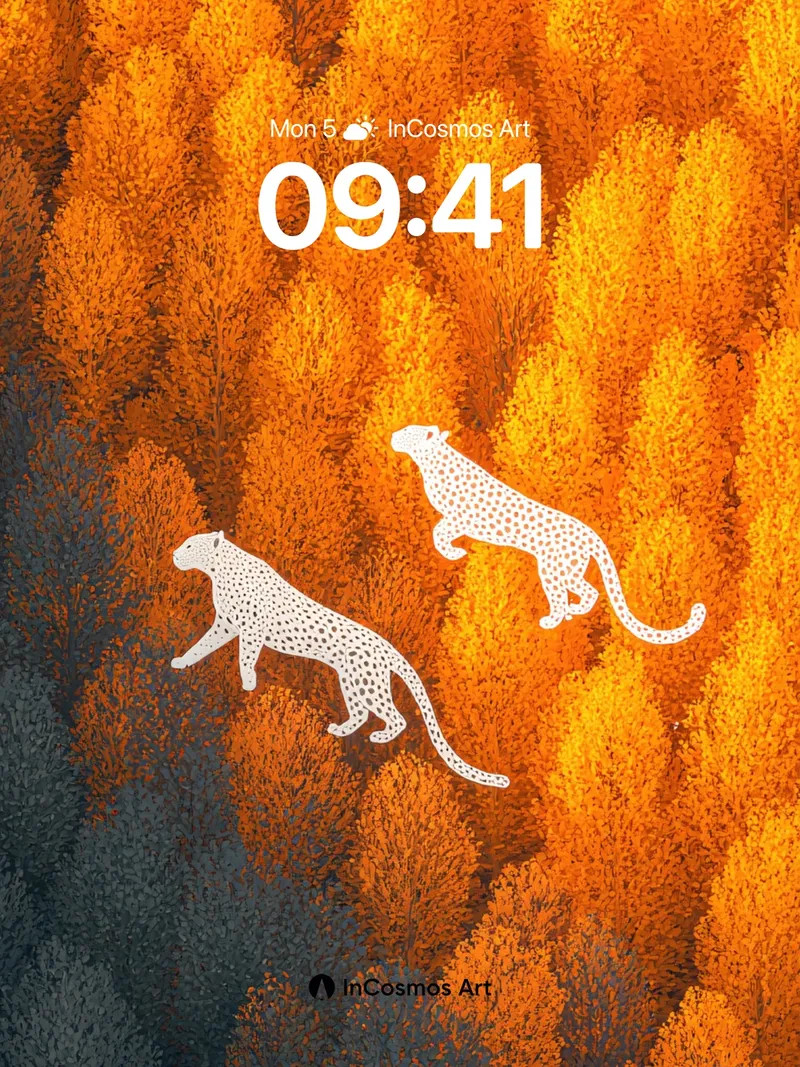Beneath the veil of darkness, life emerges in its most primal form. The spotted leopard strides across molten rock veins, its silhouette resembling flowing gold over the earth's surface, symbolizing untamed instinct. The white tiger stands still by water, gazing at a dragonfly; between light and shadow, strength and fragility balance delicately. Another white tiger stands amid deep blue mist, as if awaiting a destined call. Horses gallop through fire and ice, one white, one black—opposites coexisting like yin and yang in cosmic rhythm. Herds of antelopes race through night, their forms blurred into streaks of light, conveying the eternal pulse of migration. These images are not isolated; they form a narrative structure about natural order, survival tension, and spiritual metaphor. Together, they point to a central idea: beyond humanity, all beings possess their own language and logic.
Reinterpreting Animals as Symbols
The leopard’s red patterns are not mere decoration but diagrams of energy flow. It runs through shadows, tail raised high, like lightning splitting silence. This motion expresses more than speed—it reveals the predator’s inner focus and alertness. Its spots stand out sharply against the dark background, suggesting individuality and solitude within a species. This artistic technique elevates animals into philosophical vessels, making them mediators between free will and natural law.
Aesthetic of Opposition and Coexistence
The dual horses create a powerful binary contrast—a white horse surrounded by flames, a black horse submerged in frost. They move forward together yet carry opposing elemental qualities. Fire represents passion, destruction, and rebirth; ice embodies calm, silence, and endurance. They share space without merging, forming dynamic harmony. This is both a natural phenomenon and a projection of internal human conflict.
Perception of Time in Collective Motion
The continuous imagery of antelope herds captures moments of group movement. Each individual is in motion, yet the whole maintains orderly alignment. Blurred trails indicate accelerated time, while uniform direction suggests an internal consensus mechanism. This scene evokes thoughts of migration, escape, and survival instincts. In the digital age, this pattern mirrors how information spreads across social media—rhythmic, directional, and collective.
Reflection in Silence
The scene where the white tiger observes the dragonfly holds deep symbolic meaning. A giant meets a tiny creature on water’s surface, vastly different in scale, yet no attack occurs. Their reflections merge, creating mirror-like symmetry. This moment reflects a transcendent awareness beyond species, and reverence for life’s essence. It reminds viewers that power does not equate to domination—true wisdom lies in restraint and observation.
Rhythm of Nature and Absence of Humanity
No human traces appear in any frame. Animals occupy central roles, environments extend from them. Mountains, flames, waters, skies—all serve the animals’ states of being. This composition emphasizes nature’s completeness and autonomy. Amid today’s ecological crisis, such imagery prompts reflection: have we lost our ability to converse with nature? As technology expands boundaries, does room remain for pure experience of life?
































